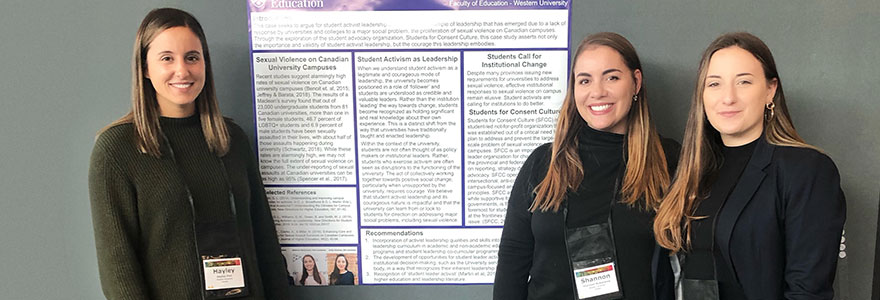
Hayley Finn, Shannon McKechnie and Emily Hartman at the International Case Competition in Ottawa. (Special to the Faculty of Education)

Hayley Finn, Shannon McKechnie and Emily Hartman at the International Case Competition in Ottawa. (Special to the Faculty of Education)
Relevant. On the edge. Thought provoking. A case study on student activism and sexual violence policies at colleges and universities has earned graduate students from Western Education a silver medal.
Hayley Finn, Emily Hartman and Shannon McKechnie were the only Canadian team competing at the International Case Competition during the International Leadership Association Conference in Ottawa. Their case study was inspired by their experience as research assistants on a SSHRC-funded research project by Faculty of Education professors Melody Viczko and Rita Gardiner on sexual violence policies at post-secondary institutions in Ontario.
In particular, they challenged the idea that student activism isn’t a credible source of leadership.
“We wanted to flip that idea to say this is where meaningful leadership is coming from and we should be listening to student activists,” said Finn.
For the competition, teams researched a contemporary social problem and its causes. Teams used leadership theory to develop recommendations to either mitigate or solve it.
The contest was comprised of three rounds. Teams presented an executive summary and poster presentation. Only teams that advanced from the first two rounds participated in the finalist presentation.
As part of the case study, the Western Education team looked at one student group, ‘Students for Consent Culture’ in Ottawa. They examined how the group formed and its impact on sexual violence policies at universities as well as provincial and federal legislation, said Hartman.
What’s more, Hartman said the collective actions of students can change the status quo. In particular, student protests, art installations and walkouts are acts of leadership.
“Student activism can make a significant impact, and can be incredibly meaningful. However, this leadership may not always look orderly or particularly 'nice' in the eyes of the institution,” said Hartman.
While the team looked at post-secondary institutions, McKechnie added student activism isn’t confined to universities. Today, it’s happening in elementary and secondary schools where students are demanding their voices be heard on a number of issues ranging from climate change to gun control.
Finn also added their presentation provided an alternative form of leadership. Instead of the traditional top-down approach to leadership where leaders use their skills to influence followers, they examined how developing relationships are important leadership characteristics. Their case study examined the relationships between student activists as well as the activists’ relationship with the institution they were trying to change.
The graduate students’ research had a positive impact on those attending the competition. They also impressed their fellow competitors.
“It was cool to see students who walked by and who were nodding, knowing this is what they were feeling, seeing and experiencing in their campuses as well,” said Hartman.
While the competition is over, their work continues. The team is planning on turning their presentation into a paper and they also want to present at the Faculty of Education’s Robert MacMillan Symposium in Education and at next year’s Congress of the Social Sciences and Humanities, which is being held at Western.